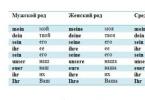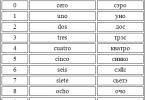Some parts of speech, called the main ones, both in Russian and in German, play the main role in the sentence - they convey the meaning of the statement. The service parts of speech, at first glance imperceptible, serve as a link between the main ones - without them, speech would be just a collection of words and its exact meaning would not be clear. The pronoun is one of those "small" parts of the language that are in both Russian and German.
personal and possessive pronouns
In German, there is a division of pronouns into personal and possessive. Personal words include such words known to us as “he”, “she”, “we”, “you” and others - in a sentence they play the role of a subject, which, as a rule, belongs to nouns.
A possessive pronoun indicates the ownership of an object. They are placed before nouns and in a sentence they play the role of a definition, which most often belongs to an adjective. Just like these parts of speech, possessive pronouns agree with nouns in the following grammatical forms:
- number;
- case.
Possessive pronouns change along these lines with the nouns they refer to.
The correspondence of personal pronouns and possessives, as well as options for their use in sentences, can be shown in the table:
| Personal pronoun | Possessive pronoun | Example | |
| ich | mein | my | Mein Tisch ist ganz neu. My table is brand new. |
| du | dein | is yours | Dein Mädchen ist schön. - Your girlfriend is beautiful. |
| er | sein | his | Sein Onkel hat Recht. “His uncle is right. |
| sie | ihr | her | Ihre Mutter ist nicht gekommen. Her mother didn't come. |
| es | sein | his her | Sein Teil ist gebrochen. “His part is broken. |
| wir | unser | our | Unsere Ergebnisse sind nicht so gut. Our results are not so good. |
| ihr | euer | your | Wo ist eure Mutze? - Where is your hat? |
| sie | ihr | their | Ihr Auto ist kaputt. “Their car is broken. |
| Sie | Ihr | your | Ihre Documente noch fehlen. - Your documents are still missing. |
Examples of possessive pronouns in German:
- mein Heft - my notebook (Neutrum (Neut.));
- mein Computer - my computer (Maskulinum (Mask.));
- meine Bürste - my brush (Femininum (Fem.));
- dein Fenster - your window
- dein Raum - your room
- deine tasche - your bag
- sein Lineal - his ruler (Neut.);
- sein Hund - his dog (Mask.);
- seine suppe - his soup
- ihr Motto - her (their) motto (Neut.);
- ihr Bericht - her (their) message (Maskulinum);
- ihre Liebe - her (their) love (Femininum);
- unser Konto - our account
- unser Begleiter - our escort (Mask.);
- unsere Treue - our loyalty
- euer Werk - your factory
- euer Saal - your hall (Mask.);
- eure Bühne - your stage (Fem.);
- Ihr Auto - Your car (Neut.);
- Ihr Kollege - Your colleague (Mask.);
- Ihre Waschmaschine - Your washing machine (Fem.).
declination possessive pronouns
Just as a verb is conjugated according to numbers and persons, possessive pronouns change according to the same grammatical indicators. In addition, pronouns can be declined according to cases. All this can be presented in the form of a table:
| case | masculine | Feminine | Neuter gender | Plural Number |
| Nominative | mein Vater | mein e Mutter | my Zimmer | mein e Bucher |
| Accusative | mein en Vater | mein e Mutter | my Zimmer | mein e Bucher |
| Dative | mein em Vater | mein er Mutter | mein em Zimmer | mein en Buchern |
| Genitive | mein es Vaters | mein er Mutter | mein es Zimmer | mein er Bucher |
Here are the options for changing the pronoun mein - all other possessive pronouns will receive the same endings depending on their declension by gender, number and case. Exercises will help you better consolidate the learned material - be sure to complete several tasks after analyzing this topic. The endings that pronouns acquire must be learned by heart.
Possessive pronouns answer the question "whose?" and denote belonging ( my answer; our work, etc.). As in Russian, all personal pronouns in German have corresponding possessives; they need to be remembered:
Note that ihr (Ihr) means both "ee" and "them" ("your").
In Russian, in addition to the listed possessive pronouns, there is one more possessive pronoun mine(own). It is "universal", i.e. can be used in place of any other possessive pronoun.
I visit their (=mine) parents every week. My friend often visits his (= his) parents. you visit his (=your) sick friend?
There is no such "universal" possessive pronoun in German. Therefore, the value "mine" in German conveyed by one of the above possessive pronouns, namely those which matches the person of the subject.
For example:
Ich besuche myine Eltern jede Woche. Mein Freund ( er) besucht seine Eltern oft. Besuchen Sie Ihren kranken Freund?
Task 1. Specify: a) in which of the following sentences does the Russian pronoun “own” correspond to the German ihr (Ihr):
1. She will finish her work in a month. 2. I haven't seen my sister for a long time. 3. Do you do your homework in the evening? 4. Oleg helps his family. 5. After college, friends will go to their native village.
b) what possessive pronouns should be used in other sentences.
Read more about possessive pronouns
Personal pronouns in German
Personal pronouns can be in a sentence not only the subject ( compare: Ich les Deutsch. Er sprichtgut.). They can also answer the questions “to whom?”, “whom?”, i.e. be a supplement. Their forms must be remembered:
| Singular | |||||
| Who? | i-ich | you - du | he-er | she is sie | it - es |
| to whom? | me - mir | you - dir | him - ihm | her - ihr | him - ihm |
| whom? | me-mich | you - dich | his - ihn | ee-sie | his - es |
| Plural | Polite form | ||||
| Who? | we are wir | you - ihr | they are sie | You are Sie | |
| to whom? | us - uns | to you - euch | im-ihnen | To you - Ihnen | |
| whom? | us - uns | you - euch | them - sie | You - Sie | |
Task 2. Indicate which personal pronouns in German can be used instead of the highlighted ones, and how the meaning of the following sentences will change:
1. Geben Sie mir bitte dies Buch! 2. Ich sehe Sie oft in der Bibliothek.
Pay attention to the fact that in Russian there are personal pronouns of the 3rd person, answering the question “whom?” ( him, ee, them) coincide with possessive ( him, ee, them).
I see his often ( whom? - "his" - personal pronoun ).
I see often his sister ( whose sister? - "his" - possessive pronoun ).
There is no such coincidence in German.
I see his often. - Ich sehe ihn oft.
I see often his sister. - Ich sehe seine Schwester oft.
Therefore the words "his", "ee", "them" in different functions correspond to different words of the German language:
him - whom? - ihn, whose? - sein
ee - whom? - sie, whose? - ihr
them - whom? - sie, whose? - ihr
Task 3. Indicate, when translating which sentences you need to use: a) the pronoun sie; b) pronoun ihr:
1. My sister Olga and her husband Nikolay live in Moscow. 2. I love her very much. 3. She has been working at the school for many years. 4. Their children - Misha and Tanya - are already big. 5. They have their own families. 6. Now I often see them.
Keys to tasks on the topic "Possessive and personal pronouns in German"
1. a) 1; 3; 5. b) mein; 4. sein.
2.1.ihm; ihr; uns; ihnen. 2. ihn; dich; sie; euch.
dein - yours
sein - his
ihr - her
unser - our
euer - your
ihr - them
Ihr - Yours
- The possessive pronoun is used as a definition for a noun and agrees with it in gender, number and case (my father, my work, their books).
- If there is a possessive pronoun, then we no longer use the article.
meine Mutter - my mother
unser Auto is our car
dein Buch - your book
There is no pronoun "one's" in German. How then can we express it? How can we say: I see my dad???
So, in German, it is important not only to decline the possessive pronoun in cases, but also to coordinate it with the word that denotes the owner. Not very clear, right? Now I'll show you some examples:
Suppose we want to say:
- I take my book.
So in a German sentence we say: I take my book. Since each personal pronoun has its own possessive pronoun.
Ich nehme mein Buch. I take my book (my book).
Du nimmst dein Buch. You take your book (your book).
Er nimmt sein Buch. He takes his book (his book).
Sie nimmt ihr Buch. She takes her book (her book).
Wir nehmen unsere Bücher. We take our books (our books).
Ihr nehmt eure Bücher. You take your books (your books).
Sie nehmen ihre Bücher. They take their books (their books).
- ich - mein - I - mine
- du - dein - you - yours
- er - sein - he - his
- sie - ihr - she - her
- wir - unser - we - ours
- ihr - euer - you - yours
- sie - ihr - they - them
- Sie - Ihr - You - Yours
As we said earlier, possessive pronouns are declined by case. Below is a table of declension of possessive pronouns.
Declension of possessive pronouns:
⠀* go through a slash masculine / feminine / neuter gender / plural
MEIN
Nominative: mein/mein e / mein / mein e
Genitive: mein es, -s / meiner / mein e s,-s / meiner
Dative: mein em / meiner / mein em / mein en,-n
Accusative: mein en / mein e / mein mein e
DEIN is YOURS
Nominative: dein/dein e / dein / dein e
Genitive: dein es, -s / deiner / dein e s,-s / deiner
Dative: dein em / deiner / dein em / dein en,-n
Accusative: dein en / dein e / dein / dein e
SEIN - HIS
Nominative: sein/sein e / sein / sein e
Genitive: sein es, -s / seiner / sein e s ,-s / seiner
Dative: sein em / seiner / sein em / sein en,-n
Accusative: sein en / sein e / sein / sein e
Nominative: ihr/ihr e / ihr / ihr e
Genitive: ihr es,-s / ihrer / ihr e s ,-s / ihrer
Dative: ihr em / ihrer / ihr em / ihr en,-n
Accusative: ihr en / ihr e / ihr / ihr e
UNSER - OUR
Nominative: unser / unser e / unser / unser e
Genitive: unser es,-s / unser er / unser e s ,-s / unser er
Dative: unser em / unser er / unser em / unser en,-n
Accusative: unser en / unser e / unser / unser e
EUER - YOUR
Nominative: euer/eur e / euer / eur e
Genitive: eur es, -s / eurer / eur e s,-s / eurer
Dative: eur em / eurer / eur em / eur en,-n
Accusative: eur en / eur e / euer / eur e
Nominative: ihr/ihr e / ihr / ihr e
Genitive: ihr es,-s / ihrer / ihr e s ,-s / ihrer
Dative: ihr em / ihrer / ihr em / ihr en,-n
Accusative: ihr en / ihr e / ihr / ihr e
IHR - YOUR (polite)
Nominative: Ihr/Ihr e / Ihr / Ihr e
Genitive: Ihres,-s / Ihrer / Ihr e s,-s / Ihrer
Dative: Ihr em / Ihrer / Ihr em / Ihr en,-n
Accusative: Ihr en / Ihr e / Ihr / Ihr e
I will be very pleased if you share this article with your friends)
Possessive pronouns, as can be understood from the word itself, express the belonging of certain objects to a person or other object.
Possessive pronouns in German are called "Possessivpronomen" and answer the question of ownership - "Wessen?" that is, translated into Russian "Whose?".
The main feature of such pronouns is that they are always used without articles. The possessive pronoun, being in front of the noun, takes on the functions of the determiner and completely replaces the article.
It should be noted that possessive pronouns in German are fully consistent with personal pronouns, denoting the very person to whom the object belongs. The possessive pronoun is a personal pronoun that is in the genitive case or, as it is denoted in German, Genitiv. Genitiv, unlike the genitive case in Russian, answers questions of ownership: Whose? Whose? and Whose?
Thus, each personal pronoun is assigned its own possessive pronoun.
Below are personal pronouns and their corresponding possessive pronouns. Examples are given after the table.
Example sentences in German with possessive pronouns:
Mein Hund heist Rex. (My dog's name is Rex.)
Dein Bleistift ist am Boden gefallen. (Your pencil fell to the floor.)
Sein Bild kostet 40 Euro. (His painting costs 40 euros.)
Sie ist gute Arbeiterin, aber ihr Lohn ist nicht groß. (She is a good worker, but her salary is small.)
Unser Nachbar hat eine neue Wohnung gemietet. (Our neighbor rented a new apartment.)
As already mentioned, all possessive pronouns in German are consistent with the person in relation to which the belonging is expressed. But this is manifested not only depending on the person, that is, the personal pronoun, but also on gender and number.
The table shows possessive pronouns in the nominative case by gender and number. 
As you can immediately see, there are some regularities in the table. Firstly, in the masculine and neuter genders, pronouns have the same endings, or rather they are absent. Secondly, the feminine and the plural also have the same endings, namely the vowel "e".
Thirdly, it is necessary to pay attention to the fact that possessive pronouns, being in the singular form, have endings as the corresponding indefinite articles ein or eine, and in the plural - as the definite articles die, der and das. This rule applies not only to the change of endings by gender, but also applies to the declension of possessive pronouns in German by case.
The following examples of sentences with possessive pronouns in various cases will help you better understand this rule.
Ich habe seinen Anzug sofort bemerkt, weil er sehr ungewöhnlich ist.
(I immediately noticed his costume, as it is very unusual.)
Gestern traf ich im Kino euren Bekannten.
(I met your friend at the cinema yesterday.)
Ich spiele mit meinem Ball.
(I play with my ball.)
Wie geht es deiner Tante?
(How is your aunt doing?)
Das Heft meines Freundes liegt am Boden.
(My friend's notebook is on the floor.)




